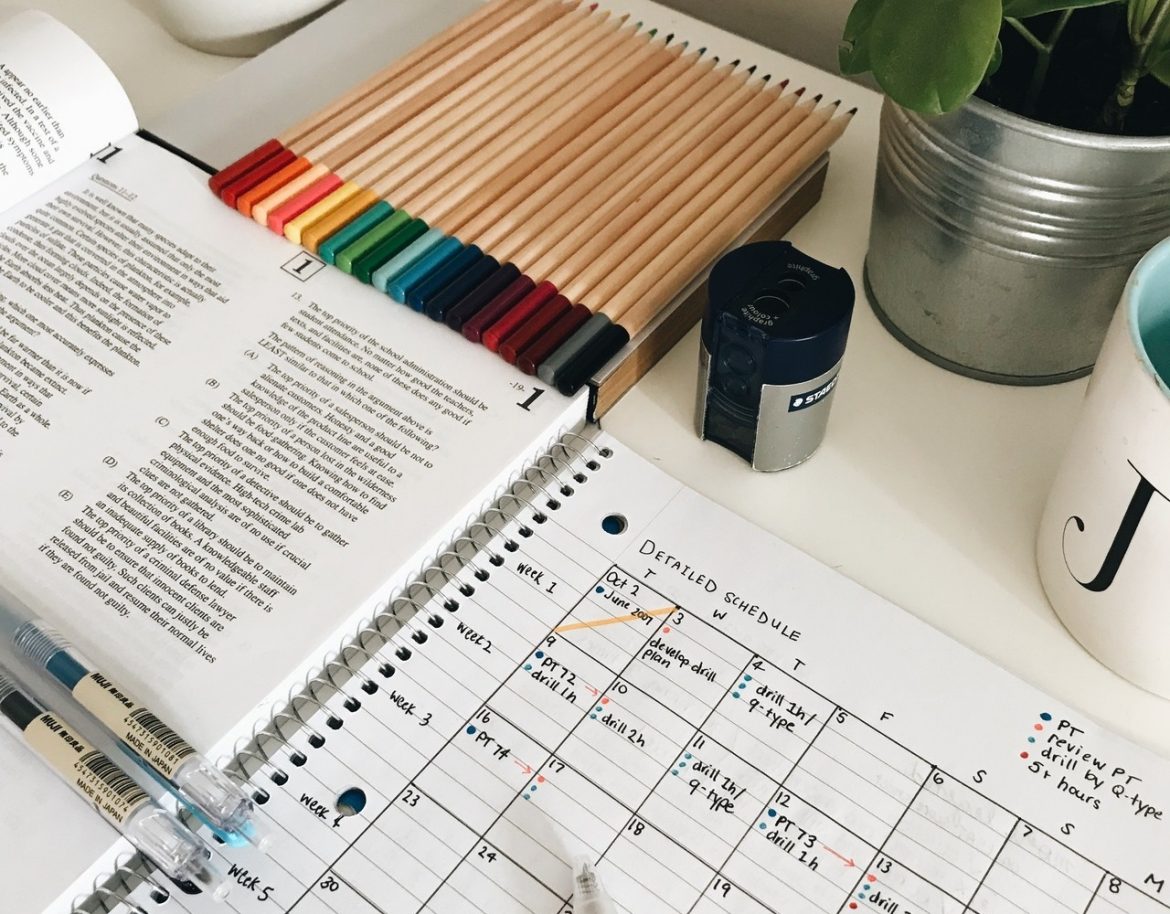Photo Credit: joanna–studies on tumblr
How to implement healthy habits while navigating online learning
Alessia Baptista, Lifestyle Editor
As we all know, the year 2020 has quickly snowballed into a complete disaster: countries like Australia have experienced tragic wildfires, the U.S government is slowly deteriorating, thousands of people have lost their lives, and all at the same time, we’ve been struck by a global pandemic. The world seems like it’s falling apart, but that doesn’t mean your personal life should start to do the same.
While our routines have shifted entirely as we slowly and painfully navigate this strange year, it’s important we develop a new routine that is catered towards how we function in this new normal.
In the beginning of quarantine, I – like many – had no idea how to use all this free time. It felt like the days were just merging together, and with each passing day, I continued to note my lack of productivity and misuse of time.
Collectively, we’ve all experienced change in some way or another within the past few months that has completely altered the way we live. For many of us, myself included, we are stuck working at home. Now, while it always “could be worse,” I’ve found it incredibly difficult to maintain my sanity completing classes online. I’ve tried changing up my work space by utilizing other rooms in my house, but nothing will ever compare to the on campus experience. I’m sure we all miss the usual routine of being on campus and socializing with friends, but we need to make the most of our at-home situations because our safety is most important. On top of living through a pandemic, we as students now need to adapt to online learning. Now more than ever, we also need to take care of ourselves mentally and physically to avoid mental deterioration.
Being online means working on your own time, between asynchronous classes and completing assignments. The best way to properly manage our time while being confined to a singular space is to create a cohesive schedule that works best for our individual situations. In other words, we need some kind of a routine in place to ensure that we stay on track.
As children, our routines are often predetermined by our parents. For example, a set bedtime was always put into place. It seems that as we grow older, and our routines are no longer planned for us, we completely abandon the concept of a structured day, ultimately making it more difficult to gain self discipline and construct a routine on our own.
Without a routine, there are several factors that are detrimental to our mental and physical health, such as an inconsistent sleep schedule, increased stress levels, procrastination, and poor well-being overall.
It all begins with how well rested you are. As students, it’s normal to find humor in how much we don’t sleep, however the competition as to who is more sleep deprived should definitely come to an end. Poor sleeping habits only make life harder, because our bodies lack energy. We need to start taking better care of ourselves because the root of the majority of our problems stems from sleep deprivation.
Lack of sleep affects the body and its ability to function at its full potential. Sleep disorder expert Dr. Harneet Walia, M.D says, “We need to make sleep a priority,” and also advises that young adults between the ages of 18-25 should receive seven to nine hours of sleep each night. The consequences that come along with not getting enough sleep can have an impact on your daily performance, as you lack alertness when you are tired. Dr. Walia also states that the solutions to obtaining better sleep habits are to maintain a consistent wake up time, put away your electronics, and make time to unwind before crawling into bed. By eliminating distractions that prohibit you from achieving a healthy sleep schedule, you will be more motivated to be productive throughout the day as a result of being more well rested.
Physical activity is another healthy habit to incorporate daily, as it coincides with having a good sleep schedule. While in isolation, we’ve become all too familiar with the idea of staying home, and with this comes the luxury of being able to lounge around all day. Especially as students consistently attending classes online, we are subject to little to no physical activity. At least pre-Covid, we had the ability to walk around campus; now we move less frequently. Exercise is a great healthy habit to incorporate into your life, because it decreases stress levels, allows you to take a break from your priorities, and leaves you with some time to take care of your physical health. To be clear, when I say exercise is important, I mean that any form of exercise is acceptable. You do not have to become the next best weightlifter in order to exercise; any type of movement counts. Personally, I find that even just going for a ten minute walk helps to clear my head; the fresh air is also a gift after being cooped up indoors for most of the day. Whether it be going for a run, doing yoga, or lifting weights, any form of physical activity is guaranteed to ease stress levels and improve those poor sleeping habits that are often interrupted by stressful thoughts that crowd the brain.
When asked about the importance of routine during our current times, a first year student studying at the University of Toronto (U of T) told The Mike that, “Without routine, it feels like everyday is the same, [it’s] like living in a cycle and it gets tiring and boring.” Other U of T students echoed this sentiment as well. A second year student mentioned that, “Routine keeps me from allowing myself to lay in bed all day.” When asked about the effects of not setting up a regimented routine each day, another student noted that, “Without a routine, I become frazzled and stressed out.”
Stress is a common factor many students are faced with, and it is also a side effect of lack of routine. A recent poll conducted by the Center for Addiction and Mental Health (CAMH), revealed that “50% of Canadians reported worsening mental health since the pandemic began.” There is no doubt that the majority of the population’s mental health is at risk as a result of the stress accompanied by the pandemic.
To decrease stress levels, a routine is of the utmost benefit because repetitive actions benefit your mental and physical health. Having a routine eliminates the stress associated with making decisions about how to manage time, while also keeping your mind occupied and focusing on tasks of top priority. Indumathi Bendi, M.D, a physician at Piedmont Healthcare states, “Carrying out routine activities reduces stress by making the situation more controllable and predictable. Preparedness is a [great] way to prevent stress.”
Essentially, the key to reducing stress all comes down to how time is managed. Making a to-do list the night before a busy day can help subside feelings of stress because everything that needs to be done has already been predetermined. This is the first step in revisiting a routine similar to the one we were given as children, only this time you are in charge of how you manage your time, and your adult responsibilities of course. Implementing healthy habits is a great way to take control of your life and know in advance what needs to be done so that you can skip that feeling of being overwhelmed when tasks pile up.
Alongside all of these factors, we need to consider the most influential factor of them all: social media. The more we use social media, we notice an increase in negative side effects. Especially now as we navigate through these difficult times, it’s easy to get lost in what the media is saying about COVID-19. While it is important to receive updates about the pandemic, it is equally as important not to overindulge in the news, as this can increase your stress levels, which creates a more overwhelming environment.
As the saying goes, you are what you eat, however in this case, I think it’s safer to say you are what you consume. In other words, we consume a number of media channels every day, which is why it is absolutely necessary to ensure that we are consuming content on these digital platforms that will inspire and motivate us to create better habits. Redirecting our attention to more positive platforms in light of the global pandemic is guaranteed to decrease stress levels that are skyrocketing during this time. However, we must ensure that the content we consume is beneficial to our mental well-being.
In a Forbes article written by Alice Watson entitled “6 Ways Social Media Affects Our Mental Health,” Watson brings awareness to the vicious cycle of social media: we envy the people we follow, resulting in feelings of jealousy. In order to combat this vicious cycle, it is crucial that we clear out our social media platforms and only consume content from people that uplift and inspire us to build better habits.
So much of what we read on social media influences our behaviour, which is why it is necessary to routinely consume positive content as opposed to viewing content that makes us envious of others. Personally, I’ve found that decluttering my social media has been very beneficial. I’ve completely shifted from following accounts that radiate negativity or just don’t reflect my personality and interests, and now have curated a positive Instagram feed that encourages me to stay on track and build better habits. I’ve found that viewing content from influencers that are organized, productive, and motivating encourages me to inherit those same habits. Again, you are what you consume, and when you consume positive content, it will be reflected in your day to day life.
Now, what to do if a routine isn’t for you? To avoid a redundant daily schedule, try implementing small changes that you look forward to every day. When you choose to give yourself a second option, you are challenging your brain by allowing yourself to make a decision. While it is important to set aside time for school work, it is rewarding to know that there is also a time to unwind and reset in preparation for the week ahead. Personally, I designate one or two days during the week in which I’ll spend a full hour getting some exercise in. I also enjoy a secluded Sunday evening where I can de-stress by reading a good book, watching a movie, or spending time away from school work. Even simple changes like making your coffee a little differently in the morning can make all the difference.
It is without question that this year is incredibly difficult. Many of us are overwhelmed by the fact that we need to transfer our lives online and complete coursework all while battling a global pandemic. Whatever your routine may look like, or perhaps lack thereof, it is important that small habits are put into place in order to maximize productivity, and to ensure that the days don’t slowly merge together. When creating a new routine, especially in isolation, it is important to keep in mind that your routine must be reflective of your lifestyle; create a schedule that meets your personal daily needs, whatever that may look like for you. When a routine is put in place, consistency is added to your daily life, ultimately allowing you to be more productive with your time. After all, when you treat the day like it’s worth something, it becomes something.




